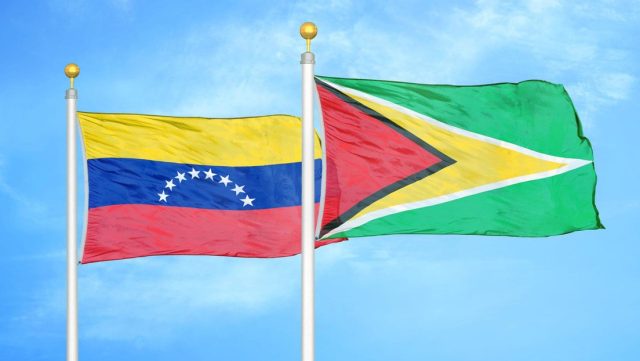What has not been resolved in 123 years, an official has wanted to settle it with a letter and a tweet. On Wednesday, the Secretary of Foreign Affairs of Guyana, Robert Persaud, made an unusual request: “Use the Twitter reporting function to eliminate” the publications in which the claimed area that is in dispute with Venezuela appear in the social networks..
According to Persaud, the maps that show the part of the territory that is subject to a dispute «violate international law». The official’s message was published as a result of a letter signed by himself and sent to the directors of Facebook (which belongs to Meta, considered an extremist organization in Russia) and Twitter to remove the alleged «illegal maps», reports the journalist Nazareth Balbás for RT.
The letter ensures that these maps are being used to «propagate a false narrative on the existing issue of the controversy between Guyana and Venezuela on the validity of the 1899 arbitration award that established the land frontier». But how true is that statement?Colonial dispossession
In the letter, Persaud assures that the proliferation of these maps in which the claimed area appears clearly delimited, have the potential to «permanently damage relations between States, incite violence against the territory and the people of Guyana, and derail the current adjudication of the matter before the International Court of Justice (ICJ)».
At the same time, he insisted on giving recognition to the International Arbitration process of October 3, 1899 through which, in his opinion, «both parties agreed to respect the results of the arbitration in its entirety, perfect and definitive settlement of the limit». However, in his exposition there are important omissions.
The 1899 arbitration award was signed when Guyana was still a British colony, but in 1966 it was considered «null and void» by the Geneva Agreement. The reason? The vices that characterized this process, among which is the fact that the voice of Venezuela was practically excluded from the negotiations.
The so-called Paris Arbitration Award – which the Guyanese official vehemently defends – was a process in which two Britons, two Americans and a Russian, who announced himself as an “impartial third party”, decided to strip Venezuela of a territory that had belonged to it since 1777.
In fact, only one Venezuelan –appointed by the US– participated in the negotiations, while the rest of the defense team was made up of US lawyers. For this reason, Caracas claims the Geneva agreement and welcomes the mechanism, established within the United Nations, to resolve the historic dispute with a practical and mutually satisfactory settlement.
Earlier this month, President Nicolás Maduro reiterated «the irrevocable position of his country» in defense of «its sovereignty and territorial integrity», and against the «irritating and disastrous sentence» of the Paris Arbitration Award. “Nothing will separate us from that path. The sun of Venezuela rises in the Essequibo!”, tweeted the president.
But beyond this new request to eliminate the maps with the claimed area, the truth is that Guyana has taken decisive steps to try to keep the disputed territory. In 2018, that country unilaterally went to the ICJ to ask it to agree to study and resolve the dispute with Venezuela over the Essequibo.
Two years later, in December 2020, the Court declared itself «competent» to analyze «the validity of the arbitration award of October 3, 1899». The resolution was rejected by Caracas, considering that it was an «instrumentalization» of that court so as «to resolve a dispute that demands a negotiated solution».Guyana raises the tone
Persaud’s request comes at a delicate moment in the relationship between Caracas and Georgetown. Earlier this month, Venezuela denounced Washington’s interference in the historic territorial dispute, following a tweet published by the US State Department’s Undersecretary for Latin America, Brian Nichols.
In a message via Twitter, Nichols assured that the land borders between Venezuela and Guyana, stipulated by the 1899 arbitration award, should «be respected at least or until a competent legal body determines otherwise», and emphasized that Washington would support a «peaceful resolution» of the matter.
The statement was immediately answered by the Venezuelan Vice President, Delcy Rodríguez, who stressed that «the Geneva Agreement is the only legal instrument in force and duly deposited in the UN to resolve, through negotiations, the territorial dispute over the Guayana Esequiba«.
“It is the Geneva Agreement and not the arbitration award that governs this controversy”, wrote Rodríguez on Twitter, after accusing Washington of wanting to add fuel to the friction between the two countries to “favor its energy hegemony and that of its transnationals”.
Tensions had already been escalating since the end of September, when Caracas accused Georgetown of wanting to distort the historical territorial dispute over the Essequibo to forge an «advertising matrix as an interested party», which would seek to «facilitate the dispossession of Venezuela from the controversial territory» that stretches for 160,000 kilometers.
According to the Venezuelan Foreign Ministry, the objective of the Guyanese Executive would be to carry out the dispossession of the territory, to «implant a transnational emporium that wishes to seize the riches of the sea, just as they have been doing abusively with the lands subject to friendly negotiation by mandate of this treaty signed to resolve the territorial dispute».
Although it is early to accept the accusations as true, Persaud’s request suggests that the official is not only unaware of the Geneva Agreement but that the dispossession of Venezuela, for the time being, could begin in the vast ‘virtual territory’.


